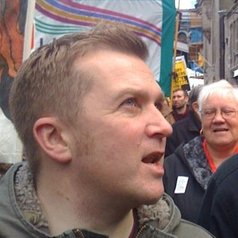At least eight journalists have been detained while covering Just Stop Oil protests in recent weeks. Their press credentials ignored, the journalists (including an LBC reporter, a documentary filmmaker and a photographer) were held for hours, fingerprinted and DNA-swabbed. Their phones and cameras were confiscated and – in at least one case – a journalist’s home was searched.
Reasons for arrest and detention included “conspiracy to commit a public nuisance”, despite journalists taking no part in any aspect of the protests. This flies in the face of the UK College of Policing’s policy. The college explicitly briefs its officers against such interference with the media in the pursuit of reporting news, advising that “facilitation of frontline media reporting during dynamic operations should be anticipated and planned for”.
So what explains the detention of reporters at recent protests – and what are the wider implications? Hertfordshire Constabulary initially said the protests were “fluid and fast-moving” and insisted that there were valid grounds to detain journalists “for questioning in order to verify their credentials”. But, following widespread condemnation from government ministers, Hertfordshire promised an investigation but also implied that not all journalists belong to “legitimate media”, and argued that those covering the protests were “part of the problem”.
Such harassment of journalists is clearly wholly unacceptable: but to fully understand these incidents, we need to place them in their wider context.
Policing the highway to climate hell
World leaders have stressed the need for urgent action on climate change. The UN secretary general Antonio Guterres warned that the world is on a highway to climate hell without it. The UK prime minister Rishi Sunak said that it is morally right for the UK to honour its climate pledges at COP27.
Just Stop Oil’s blocking of roads and motorways to draw attention to the lack of action despite widespread political rhetoric has proved highly controversial. There have been claims that road blockades have halted emergency vehicles and prevented motorists from reaching appointments or funerals. The chaos has led some drivers to take the law into their own hands.
Activists recently occupied motorway gantries on the M25 in England, obliging police to stop traffic while they could be removed. Police have a duty to facilitate peaceful protest, but must balance the rights of protesters with those of other citizens. Police action to remove protesters may be necessary and proportionate – but the same cannot be said of the decisions to arrest journalists who were neither blocking traffic nor obstructing a police operation. Preemptively limiting media access is the hallmark of an authoritarian rather than democratic state.
We closely observed police operations during COP26 and found Police Scotland were accommodating to researchers and proactively engaged with the media. There was little confrontation and no more than a handful of arrests at COP26. But year on there are now serious questions about police responses to climate protests in the UK. Recent arrests need to be understood in light of discourses around protest in the press and parliament.
A hostile environment for protest
In 2021, the government was granted an injunction against road blocking by Insulate Britain, resulting in multiple jail terms. Similarly this year, politicians from different parties have supported legislation during 2022 to clamp down on disruptive or noisy protests. The Public Order Bill (which was passed by parliament and is currently being scrutinised by a House of Lords committee) will criminalise locking on and “interfering with key national infrastructure”, and “extend stop and search powers for … protest-related offences”.
The Bill aims “to give police the tools they need to tackle dangerous and highly disruptive tactics, used by a small minority of protesters, to wreak havoc for people going about their daily lives”. At a time when UN chief Guterres says climate crisis presents the world with a choice between collective action and collective suicide, UK leaders appear to be doubling down on punishing protesters rather than addressing the causes of global heating.
The home secretary, Suella Braverman, rails against the “Guardian-reading, tofu-eating wokerati”; the leader of the opposition, Keir Starmer, supports “longer sentences for those gluing themselves to roads and motorways”; the press sensationalises “eco-zealots” and “eco-mobs”. The result is a hostile environment for protest.
Sunak joined those calling for press freedom in the wake of the arrests, conveniently forgetting the role of his government in demonising environmental activists. Stephen Reicher, professor of social psychology at the University of St Andrews, warned that the bill effectively “delegitimates protest in the eyes of the police” by presenting activists – and those surrounding them – as troublemakers to be controlled. As one journalist put it:
I don’t blame the individual officers. It seems they are a symptom of a much wider and hugely alarming problem.
Whatever one thinks about Just Stop Oil, antipathy towards radical environmentalism among politicians and the media is having wider consequences. A 2020 report by Oxford University academics described it as having a “chilling effect” on what both police and the public see as legitimate protest, with serious consequences for democracy.
The harassment and detention of journalists doing their job shows that crackdowns on dissent don’t only impact “eco-zealots”: they threaten everyone.



 Nasdaq Proposes Fast-Track Rule to Accelerate Index Inclusion for Major New Listings
Nasdaq Proposes Fast-Track Rule to Accelerate Index Inclusion for Major New Listings  BTC Flat at $89,300 Despite $1.02B ETF Exodus — Buy the Dip Toward $107K?
BTC Flat at $89,300 Despite $1.02B ETF Exodus — Buy the Dip Toward $107K?  FxWirePro- Major Crypto levels and bias summary
FxWirePro- Major Crypto levels and bias summary 
































